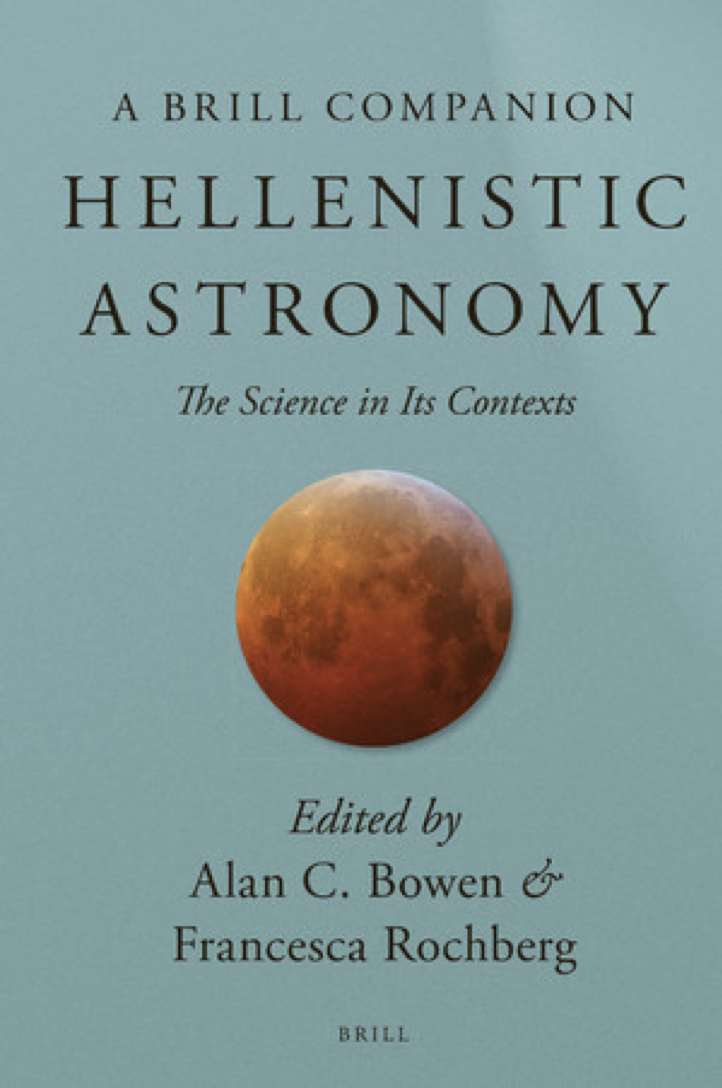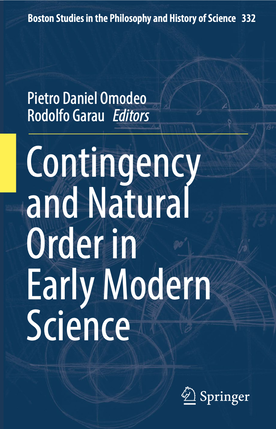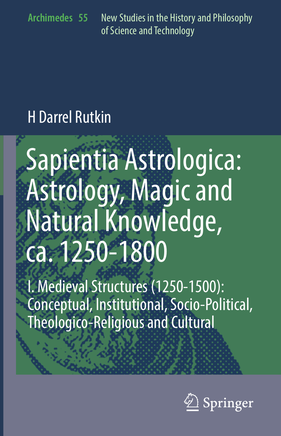The Astrology of the conjunctions by Stephan Heilen
AstroBibl: History of Western Astrology – Bibliography
The AstroBibl can be found at: https://ptolemaeus.badw.de/astrobibl/start
Hellenistic Astronomy: The Science in Its Contexts
"Astrological Contingency: Between Ontology and Epistemology (1300-1600)" by Steven Vanden BroeckePublished in the edited volume Contingency and Natural Order in Early Modern Science, this paper argues that the change from medieval to early modern Latin astrology involved, among other things, a shift in dominant interpretations of the relation between celestial influence and sublunary life, as well as of the precise nature of astrology’s inherent contingency as a conjectural art. The Latin astrological tradition of the late middle ages, we argue, approached astrology as an “art of embodiment,” in which anagogy and self-governance were considered more fundamental than self-protection and utilitarian knowledge. These priorities also shaped attitudes toward the contingency of astrological prediction. The uptake of astrology as an art that operated within an ontological domain circumscribed by the presence of matter entailed a fairly relaxed attitude about astrological contingency as an inevitable ontological phenomenon. Steven Vanden Broecke, “Astrological Contingency: Between Ontology and Epistemology (1300-1600),” in Contingency and Natural Order in Early Modern Science, ed. Pietro Daniel Omodeo and Rodolfo Garau (Cham: Springer, 2019), 137–55. https://doi.org/10.1007/978-3-319-67378-3_7
Sapientia Astrologica: Astrology, Magic and Natural Knowledge, ca. 1250-1800 by H. Darrel Rutkin
The Abraham Ibn Ezra–Peter of Limoges Astrological-Exegetical ConnectionThe article enlarges the circle of the Latin admirers of Abraham Ibn Ezra (ca. 1089–ca. 1161) to include Peter of Limoges (second half of the thirteenth century), who spent most of his life in Paris. The first part shows that Peter of Limoges had a hand in the Latin translation of Ibn Ezra’s Sefer ha-Meʾorot (Book of the Luminaries), of a section of his Reshit Ḥokhmah (Beginning of Wisdom), and of selected chapters of Sefer ha-Moladot (Book of Nativities). The second part studies Peter’s modus operandi in selecting texts for translation. In particular, it shows that the Latin translations associated with Peter of Limoges were based on Hebrew-into-French translations of Ibn Ezra’s astrological works carried out by a certain Hagin le Juif; in addition the earliest available manuscript containing a collection of these French translations belonged to Peter of Limoges, who commissioned it for his own use. The third part shows that Peter of Limoges, unlike other Latin translators of his time, was acquainted not only with Ibn Ezra’s astrological work but also with his biblical commentaries.
Aleph 19.1 (2019) Origins and Transmission of Liber Abraham Iudei de NativitatibusThe Liber Abraham Iudei de Nativitatibus is a Latin astrological treatise that has no surviving Hebrew counterpart, and whose affiliation with Abraham Ibn Ezra (ca. 1189-ca. 1160) is unclear. Till now De nativitatibus has been known to modern scholarship almost exclusively through the first print edition, produced in Venice in 1485. Building on the mention in the print edition of 1154 as the date of composi- tion, it has been argued that De nativitatibus was written in Latin by Ibn Ezra or with his active participation for a Latin readership. The present paper presents a totally new picture by taking into account the evidence provided by virtually all the available manuscript witnesses of this text and other unknown sources. It will be shown that the archetype of De nativitatibus was written in Hebrew by Ibn Ezra, that De nativitatibus was composed in Latin in 1166 or slightly later, when Ibn Ezra was no longer alive, that De nativitatibus was transmitted in four very different versions, and that one of these versions was written by Henry Bate, who first translated into Latin a collection of Ibn Ezra’s astrological writings. Revue des études juives, 177 (3-4), 2018, pp. 317-352. https://doi.org/10.2143/rej.177.3.3285576 Calculating Birth: Abraham Ibn Ezra’s Role in the Creation and Diffusion of the Trutina Hermetis"For the doctrine of nativities, concerned with making predictions about the fate of individuals and regarded since Antiquity as the core of the art, the time for which the horoscope should be cast is the precise instant of birth.
But this was the Achilles’ heel of the doctrine of nativities, because people do not generally know or remember the precise moment of their birth. Consequently, an essential component of virtually every treatise on the doc- trine of nativities, whether in Greek, Arabic, Hebrew, Latin, or the European vernaculars, is the ‘rectification of the nativity’, a term that designates a variety of procedures to determine the ascendant of the natal horoscope when the time of birth is not known (the usual situation). One approach, perhaps the most famous of all and that with which we are concerned here, had long gone by the curious name trutina Hermetis, that is, the ‘balance of Hermes’. The main char- acteristic of this method, as we shall see, is that it takes account of the duration of pregnancy in order to ‘rectify’ the nativity. With the trutina Hermetis, the time of conception and the instant of birth become an astrological instrument of calculation, denying or correcting a piece of information that had always been under female control. This paper scrutinizes the role that the trutina Hermetis played in the work of Abraham Ibn Ezra (1089–1167), both his astrological treatises and his biblical commentaries." In: Pregnancy and Childbirth in the Premodern World: European and Middle Eastern Cul- tures, from Late Antiquity to the Renaissance, ed. by Costanza Gislon Dopfel, Alessandra Foscati, and Charles Burnett, (Turnhout: Brepols, 2019) pp. 79–106 https://doi.org/10.1484/M.CURSOR-EB.5.117819 The medieval Moon in a matrix: double argument tables for lunar motionAstronomers have always considered the motion of the Moon as highly complicated, and this motion is decisive in determining the circumstances of such critical celestial phenomena as eclipses. Table-makers devoted much ingenuity in trying to find ways to present it in tabular form. In the late Middle Ages, double argument tables provided a smart and compact solution to address this problem satisfactorily, and many tables of this kind were compiled by both Christian and Jewish astronomers. This paper presents multiple examples of the diversity of approaches adopted by compilers of tables who used this powerful tool, and brings to light intellectual interactions among them that are otherwise hidden from view.
|
Books & PapersSome of the recent publications on the history of astrology and related fields Archives
June 2020
Categories |






 RSS Feed
RSS Feed
